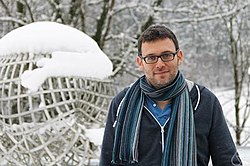
Benjamin Schlein (born 28 May 1975 in Lugano, Switzerland) is an Italian [1] mathematician and professor at the University of Zurich. Schlein's research is mathematical physics. He works in mathematical analysis of many-body quantum systems and random matrix theory.